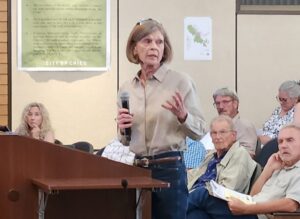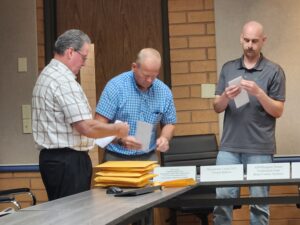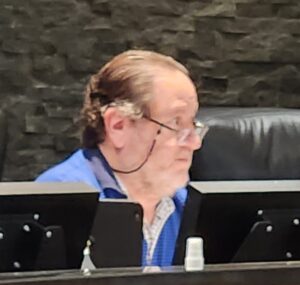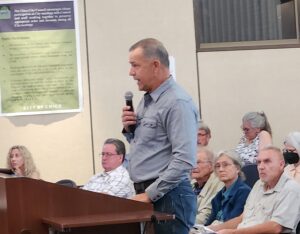A groundwater management board charged with managing a large portion of Butte County’s water supply met a tide of resistance July 26 to a new fee that will be levied on Chico property owners.

The fee was approved by the Vina Groundwater Sustainability Agency (GSA) Board in a 5-0 vote and set at $1.54 per acre for the 2023-24 property tax year. It will thus be almost unnoticeable for small-parcel owners, but ranchers who spoke at the public hearing, held in the Chico City Council chamber, objected that it was inherently unfair to large landowners who aren’t extracting water.
Ranch owner Billie Roney said she and her husband were “shocked” to learn the new fee was in the pipeline. “We’re not irrigating,” she told the Vina GSA board. “The fee structure is not fair. We just keep getting pummeled.”
Board member Tod Kimmelshue said he wanted the board to explore options to set a fee in the future that would be related to water use or extraction. Board members indicated they needed to fund the agency quickly at this point rather than re-start the fee-imposition process.
More than 16 people spoke during the public hearing, all opposed to the fee and many objecting to the fact that it doesn’t reflect groundwater use and provide exceptions to owners of grazing lands who don’t extract water.
“I think what they’re doing is unconscionable, I really do,” said Roney, a mid-sized cattle rancher in a telephone interview today. “Rangelands serve to recharge the aquifer. Vernal pools flourish with cattle grazing. We feel we’re doing a service.”
Board members also certified the results of a protest election that failed to block them from setting the fee. In the protest election –- which concluded with the public hearing — only property owners who opposed the fee were expected to vote, and by law a majority of Chico landowners would have had to submit a “no” vote.

That meant that to block the board from setting the fee, 17,712 property owners needed to submit a “no” vote in an election that had caused widespread confusion.

Board Chair Evan Tuchinsky indicated there had been 546 protest ballots submitted, including 124 submissions at the public hearing. (Tuchinsky is better known in town as weekend editor at the Chico Enterprise-Record.)
Some of the speakers opposing the fee said they didn’t receive a protest ballot form or discarded the flier from Vina GSA without realizing what it was. A few seemed not to understand the unusual protest-election concept.
“It just looked like junk mail,” said Groundwater for Butte spokesperson Emily Alma at the public hearing.
The water table in the Vina Subbasin has been declining, and both state and county officials want that trend reversed. The state’s Department of Water Resources (DWR) today announced approval of the groundwater sustainability plans for Butte, Vina, and Wyandotte Creek that were all submitted last year. (DWR’s analyses are included in the Butte County Water Commission agenda packet on page 75 here.)
The groundwater sustainability plans that have been drafted throughout the state “will continue to address the impacts of ongoing weather extremes associated with climate change,” said DWR Deputy Director of Groundwater Management Paul Gosselin.
Gosselin previously worked as director of Butte County’s Department of Water & Resource Conservation while the groundwater plans were drafted.
The GSAs formed in response to the 2014 passage of the state’s Sustainable Groundwater Management Act (SGMA) that requires balanced groundwater conditions by 2042 through local management.
The fee is designed to produce revenue that will fund GSA administration, legal defense and SGMA compliance. The Board originally hoped to impose a fee of $3.09 but reduced it after hearing testimony and with the expectation that a $5.5-million grant will be coming to the area.
If local management fails and the state steps in, it imposes its own fees. Some landowners, including Roney, said they’d be better off with the state-imposed fees.
The Vina board approved a resolution that allows it to raise the fee to $3.09 in coming years, without the requirement that it provide opportunities for opposition through a protest election.

Henry Lomeli, representing Eagle Creek Ranch, said that $3 fee would cost the ranch $23,000 a year.
“SGMA was designed to deal with abuses with extraction of groundwater,” Lomeli said, “but we don’t extract water.”
He wondered out loud how land ownership became, to this extent, such a “taxable event.”
The water watchdog nonprofit AquAlliance has opposed implementation of the groundwater plans and is suing the GSAs for Vina, Butte and Colusa.
“These three GSAs are not going to protect domestic wells and groundwater-dependent ecosystems,” said AquAlliance water analyst Jim Brobeck.
Critics like Brobeck argue that the plans will lead to water table depletion to alarming levels during the aquifer recharge operations that are planned. He believes the plans were designed to “increase California’s water supply” by integrating the state’s “last robust aquifer” into a statewide market.
Christina Buck, assistant director for the county’s Water & Resource Conservation Department that has provided staff support to the GSAs, said the plan sets thresholds that can be adjusted at five-year evaluation intervals and were designed to prevent ecosystem damage.
In the meantime, the Vina GSA can work to plug a “data gap” with new, shallow monitoring wells that are needed, she added.
The most urgent objections at the public hearing came from ranchers like Megan Brown.
“Fees like this are going to put me out of business,” Brown said. “I’m hanging on a by a thread.”
Leslie Layton is editor of ChicoSol and a freelance journalist.

After looking carefully into the county’s SGMA compliance effort for two years now, I am close to seconding Ms. Roney’s conclusion: Compared to this proliferation of taxing agencies the County is setting up, the State of California coming in and monitoring all wells might be, well, less awful.
Which doesn’t mean to say I think the State doing the job would be ideal or even desirable. But what the County is doing looks more expensive, less accountable to the public, and far less likely to actually do something real about the groundwater situation before irreversible damage is done.
Which, last time I checked, was supposed to be the point.
Butte County could have simply asked the voters for a small extra property-tax assessment to manage groundwater sustainability for all sub-basins. The public already has a perfectly competent and professional Department of Water Resources and Conservation up and running, and it could be expanded. Instead the county is sectioning off the effort into small fiefdoms – Groundwater Sustainability Agencies, some 14 of them – all of which require separate funding streams, offices, staff, websites, and the rest. (And indeed, a Butte County GSA has been set up to manage the scraps. Couldn’t it manage the basins as a whole, under one roof? Why not?)
In my neighborhood, they’re pushing through this Tuscan Water District, which will raise an unspecified amount in public funds to build expensive infrastructure for “recharge” efforts that no scientist I’ve spoken to believes will even work. Adding to the irony, setting up a California Water District will inevitably make the basin vulnerable to emergency withdrawals by the State during declared drought emergencies. So much for local control.
Will all these new taxing authorities have their own scientists and state-law navigators – or will they keep calling up Oroville for help, as they have been doing? How much waste and redundancy are they engaging in while insisting the State’s meters and fees would be the worst evil imaginable?
The result of all this government sprawl will likely be confusion, waste, and public disengagement at a moment when there is no time or money to lose in safeguarding the groundwater for future generations. Leadership of these little boards is, and will be, dominated not by publicly accountable officials but by hand-picked “stakeholders-” in other words, mostly the very people and interests causing the overdrafting problem in the first place. Inviting one hand-picked domestic well owner along for the ride doesn’t equate to democracy.
Supervisor Tod Kimmelshue is on multiple water-related boards as well as LAFCo. He has agricultural property and thus a personal financial stake in his own public decisions. He has long been involved with the agricultural Groundwater Users of Butte County, the nut-industry special-interest organization that spearheaded the Tuscan Water District – indeed ran for office as the nut guy (“Nuts for Tod!”). These entanglements suggest serious conflicts of interest in his de facto leadership of the county’s groundwater-management governance.
It is phoniness when they claim the public has meaningful input into any of these bodies. Anybody who has witnessed a GSA meeting knows that its public-comment periods are just window-dressing for decisions already made behind close doors, by the same group of powerful insiders who now dominate the Butte County Board of Supervisors, Butte County LAFCo, and every one of the GSAs. Their close ally Paul Gosselin, former County Dept. of Water Conservation and Resources director, designer of the web of taxing agencies and water districts we’re being saddled with to keep the State out of local affairs, is in fact now high up at the State’s SGMA-compliance office. (Which just approved, unsurprisingly, all these sustainability plans, even though they are tied up in litigation).
“Local control” is meaningless if it is not publicly accountable local control – and this sprawl of new authorities appears to have been designed from the get-go to dodge democratic accountability and turn control of the groundwater over to private interests.
That’s how we’ve come to this point where our neighbors are ready to risk draining the water right out from under our houses, while handing us a property-tax bill to add insult to injury. It’s rude, it’s unlikely to do a thing for groundwater sustainability, and it’s forcing those of us not favored with money-greased favor on the Board of Supervisors and its weak and pliable GSAs to make a choice: Sell out early and get out of their way before our home values crash, or band together and fight it all in court.
Jeffrey F. Obser
Communications Director
Groundwater For Butte, a Political Action Committee
Thank you J-Bro and Barbara. And Emily, yes, it looked like junk mail, just like the sewer “rate change” notice that everybody threw away. I frankly never throw away any piece of mail without inspecting it, but when I tried to contact the number and the email listed in the notice I didn’t get any response until days before the second hearing. And then it was a county staffer who thought Kami Denlay was still on council and still the council liason to the water board. This is what we’re dealing with – our government staff and elected leaders are bamboozling us for more money, but they knew this would not pass on a real ballot, they had to sneak it in under the guise of junk mail. And we paid for the consultants that showed them how to do it!
Should I run against Doug Teeter?
Yes